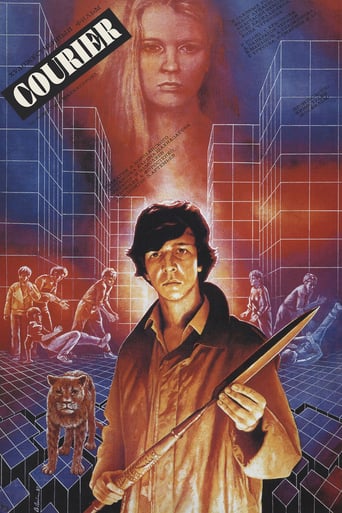samanthamarciafarmer
I imagine that Courier holds a similar place in Russian youth culture to the role John Hughes' movies hold in American culture; at the very least, I hope it does. Shakhnazarov's film is recognizably set in the 1980's, but it also seems to be timeless (besides the idiosyncratically 80's music), and this is perhaps due to the selective portrayal of Moscow. The majority of cinematic depictions of the city, where famous locations are shown at a remarkable landmark to frame ratio, make the city so prominent that it's hard to differentiate it from human characters. In Courier, however, the uniformity of Soviet dwellings and buildings make the city anonymous; the only obvious references to it are in name only. This adds to the universality of the film and Ivan's experiences. While Ivan frustrates with his nonchalance and frequent lying, the poetic scenes that Shakhnazarov fits in the corners belie the heart of the film, as well as the inner workings of Ivan's mind. Stereotypically "African" warriors haunt his dreams; he converses with a bust of his very-much-alive father in a mausoleum. At the end of the day, Ivan comes off as scared and confused at the aftermath of his parents' divorce that overshadows his mother's and his own life. The film vacillates between a gritty, saturated daily life and a surreal subconscious effortlessly. By the end, the viewer finds themselves sympathizing with Ivan. It is an accessible film for all ages in any era, although unfortunately my own life doesn't include break dancing to heavy synthesizers as the sun sets.
FilmCriticLalitRao
It is true that Russian film "Courier" is more than 25 years old but its emotional as well as intellectual impact continues to be astounding. Each time a viewer sees it, one is reminded of the struggles for freedom which people of the past had to undergo. It is somewhat autobiographical in nature as it depicts some events which took place in Mr.Karen Shakhnazarov's life. It was directed by him in 1987 but depicts what happened to him as a youngster two decades ago in 1967. Much of the film is based on the point of view of a non conformist, upper middle class youth whose views indirectly influence his girl friend too. We also get a chance to see a huge chasm in the form of generation gap. Karen Shakhnazarov maintains the balance as he gives an honest perspective of the difficulties faced by parents while raising their children.Courier has its share of comic scenes too but not they cannot be classified as slapstick comedy scenes. The best example of this film's artistic mischievousness is reflected in a scene wherein the film's protagonist, claiming some lines by the great Russian poet Pushkin as his own, confidently reads them to impress an influential person. It was in 1987 that film critic Lalit Rao watched "Courier" for the first time on India's national television network "Doordarshan".This film was part of a series of award winning foreign films which were shown rather late in night. A whole generation of cinéphiles in India were formed by watching such world cinema classics.
juan_palmero2010
Early Perestroika years in Moscow. The Communist regime has brought about relative wealth and comfort, but also growing differences between the haves and the have nots. Belonging to the middle-upper class means working hard and conforming. Ivan Miroshnik is a teenager pampered by his mum who has just divorced. He plans neither to work hard nor to conform. After uncaringly failing his university entrance exams, he does not know what to do with himself, but mum finds him a job as a messenger boy in a small editing house. On his first day at work Ivan is sent to take a parcel to professor Kuznetsov, who belongs to the successful upper class. On arrival, he meets Katya, the professor's daughter, and quickly and effectively sets out to charm her with his cheek and impudence. Katya has led a protected life and quickly takes to Ivan's "originality", while Ivan goes with the flow. As to professor Kuznetsov, he decides that Ivan is just a supplied, rude and nihilist young man.Ivan and Katya meet, alone or with their usual group of friends, and class differences soon become painfully obvious. Ivan's constant dubious practical jokes, probably the only means he has to try and please, start to lead to very unpleasant situations.This film is about the wavering of youth, sexual attraction among people with different backgrounds, about clashes between generations, the end of the Soviet Union and the rejection of its values by younger people. Very interesting and honest analysis of Katya's psyche, achieved with just a few brush strokes.This film got several prizes when it was released, and has aged well, since it contains sufficient reflections on universal issues (clothes and hairstyles aside, perhaps). Good musical score by E. Artemev.
LE020
I first saw "Kuryer" when I was 8. All I remember is the change of moods that it inspired in me--from tears of laughter to gloomy sadness. Were I born 6-7 years earlier, I might have very well experienced the dillemmas that confronted the young hero of this film...

